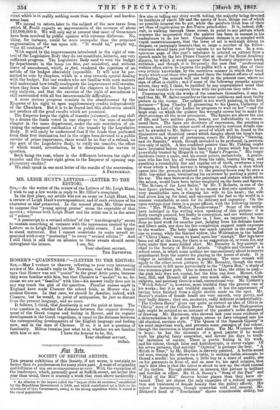HOMER'S "QUAINTNESS :"—(LETTER TO THE EDITOR). &a,—May I venture to
observe, referring to your very interesting review of Mr. Arnold's reply to Mr. Newman, that when Mr. Arnold says that Homer was not "quaint" to the great Attic poets, because they were familiar with him, but that Chaucer is "quaint" to us, be- cause we are not "familiar" with him—his answer really does not in any way touch the gist of the question. Peculiar causes might in Entyland have made Chaucer the school bible, as Homer was in ancient Greece. In that ease, we should be familiar, indeed, with Chaucer, but he would, in point of antiquation, be just as distant from the present language, and no more. point at It follows, I think, that familiarity is not the point at The
tree question is, whether the distance between the organic develop- ment of the Greek tongue and feeling in Homer, and its organic development in the Greek tragedians, is equal to the distance between the corresponding developments of the English language and feeling now, and in the days of Chaucer. If so, it is not a question of familiarity. Milton remains just what he is, whether we are familiar with him or not. I have the honour to be, Sir, Your obedient servant,






























 Previous page
Previous page